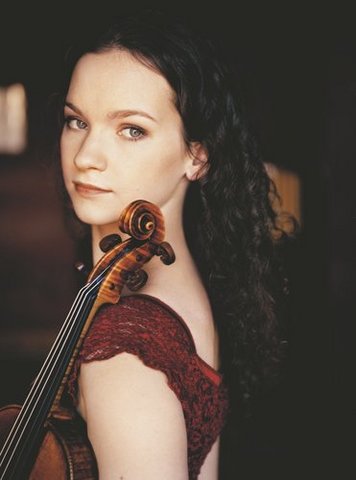Hahn and Smythe shine in Bach and Auerbach
It’s been a big year for Hilary Hahn.
The American violinist won a Grammy in February for her 2014 album with pianist Cory Smythe, “In 27 Pieces: The Hilary Hahn Encores.” And last month she announced her pregnancy via social media, with a midsummer due date.
Hahn returned to Chicago for a well-balanced recital with Smythe that offered three of her commissioned encores Sunday afternoon at Symphony Center.
For two artists whose careers have been defined by cross-genre exploration, Sunday’s program offered a diverse and refreshing lineup of old and new, even with sometimes unequal execution.
John Cage’s Six Melodies may have been a risky choice for an opener, with its languid parade of minimalist harmonics. It proved a disorienting start, and a marked contrast to David Lang’s light moving, a mercilessly rhythmic study in moto perpetuo which immediately followed.
For all her zest for contemporary repertoire, Hahn didn’t make an especially compelling case for either piece. Cage instructs the soloist to bow lightly across the strings and use vibrato sparingly. In a venue problematic for solo strings since the ill-fated 1997 renovation, Hahn’s sound was too often swallowed up; while not her fault, a more robust tone would have compensated for the acoustical deficit.
Lang’s light moving proved no more engrossing, a steady stream of sixteenth-notes punctuated by occasional accents that received a rather bland, half-hearted rendering.
The violinist shone, however, in another of her encore pieces, Lera Auerbach’s haunting and intricate Speak, Memory. Auerbach’s dark, brooding soliloquy shares the eloquence of its literary namesake (Nabokov described his memoirs as belonging to “the harmonious world of a perfect childhood”), and was played sensitively by both musicians.
The high point of the first half, if not the entire recital, came with Bach’s Partita in E Major Partita. Effortless, resonant, and in every way sublime, Hahn’s rendition reaffirmed her reputation as one of the premier Bach interpreters of our time. Her tender phrasing proved consistently persuasive: the Loure was sweetly lyrical without a hint of mawkishness, and she subtly varied each return of the Gavotte en rondeau’s theme.
The two sonatas on the program also saw Hahn at her best. Debussy’s Violin Sonata began with an unassuming lightness, which, at times, threatened to turn wispy and indistinct. But her interpretation picked up power as the music itself grew more assertive, making the whirling, virtuosic finish all the more satisfying.
Schumann’s stormy Violin Sonata No. 1 in A minor made an impressive concert closer. Hahn’s chemistry and cohesion with Smythe was apparent in this flexible performance, which captured both the introspective ebb and flow as well as the frantic energy of the piece, performed by both with throbbing intensity.
Unsurprisingly, the afternoon’s encore was another one of Hahn’s encores: Hilary’s Hoedown, a wily, rumbustious romp by British composer Mark-Anthony Turnage that left patrons smiling as they exited the hall.
Hannah Edgar is a violinist and first-year student at the University of Chicago. She is associate arts editor of the Chicago Maroon, where she regularly contributes music reviews. She was recently named WFMT-FM’s first Andrew Patner Fellowship Intern.
Posted in Performances





